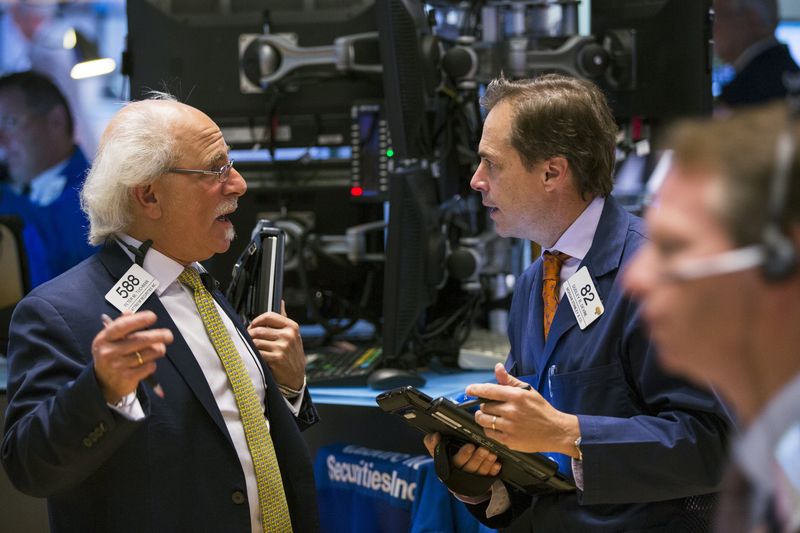Investing.com - Rhetoric rather than economics could be the main driver of sentiment in the week ahead, as investors watch further developments in the ongoing trade dispute between the United States and China.
Washington and Beijing have been engaged in a trade spat for the most part of the year, with both countries slapping tariffs on several of each other's imports.
The tariffs have raised concern in the market about a potential slowdown in global economic growth.
Besides trade rhetoric, the U.S. will see a relatively quiet week in terms of economic releases as the market winds down for the Thanksgiving holiday, with reports on the housing sector and durable goods orders expected to draw the most attention.
On Wall Street, there are a number of big-name retailers such as Target , Best Buy and Lowe's, reporting results in the week ahead, as the third-quarter earnings season winds down.
Markets stateside will remain closed on Thursday for the Thanksgiving holiday and Friday will be a half-session day on Wall Street.
The holiday-shortened week ahead also brings Black Friday, the traditional start of the U.S. holiday season, but analysts say it has lost its importance with online shopping wreaking havoc on traditional retail.
Meantime, in Europe, traders will focus on flash survey data on euro zone business activity for November, which should give some indication of how the region's economy is coping with global trade conflicts.
Political headlines will also be in focus as investors watch developments surrounding Brexit and Italy's ongoing budget crisis.
Ahead of the coming week, Investing.com has compiled a list of the five biggest events on the economic calendar that are most likely to affect the markets.
1. U.S.-China Trade Developments
Markets will be keeping abreast of the ongoing trade spat between the U.S. and China to see if any more news materializes following reports that Washington might pause on further tariffs against Beijing.
U.S. President Donald Trump said on Friday that he may not impose more tariffs on Chinese goods after Beijing sent the U.S. a list of measures it was willing to take to resolve trade tensions.
But Trump added that there were "four or five big things left off" the list of 142 items sent by China.
The U.S. had said it would not restart negotiations on a trade deal until it saw a concrete response to China on its demands.
The U.S. has slapped tariffs on $250 billion in Chinese imports, for which China has retaliated, after several rounds of negotiations failed to resolve U.S. complaints over Chinese industrial policies, lack of market access in China and a $375 billion U.S. trade deficit.
Trump has threatened to impose tariffs on all remaining Chinese imports - about $267 billion more in goods - if Beijing fails to address U.S. demands.
Trump is expected to meet Chinese President Xi Jinping on the sidelines of the upcoming G-20 summit in Argentina later this month, though expectations are low that the meeting will yield any major results.
2. U.S. Housing Data
The Commerce Department will publish a report on building permits and housing starts for October at 8:30AM ET (1330GMT) on Tuesday.
The data is expected to show that building permits dipped 0.8% to 1.260 million last month, while housing starts are forecast to show a gain of 1.6% to 1.225 million.
Recent data has painted a worrying picture of the U.S. housing market, which is struggling with rising mortgage rates and tight inventory.
3. U.S. Durable Goods Orders
The Commerce Department will release data on October durable goods orders at 8:30AM ET (1330GMT) Wednesday.
The consensus forecast is that the report will show orders for durable goods fell by 2.5% last month. Core orders, which exclude volatile transportation items, are forecast to rise 0.4%.
This week's holiday-shortened calendar also features U.S. data on existing home sales, initial jobless claims, revised Michigan consumer sentiment, as well as flash manufacturing and services PMI readings.
The Federal Reserve is widely expected to raise interest rates again next month, having already increased borrowing costs three times in 2018.
4. Retailers Highlight Final Week of 3Q Earnings Season
The third-quarter earnings season has wound down, but results are expected from a number of retailers in the week ahead.
L Brands (NYSE:LB) and Urban Outfitters (NASDAQ:URBN) are both due to report after markets close on Monday.
Target (NYSE:TGT), Best Buy (NYSE:BBY), Lowe’s (NYSE:LOW), Kohl’s (NYSE:KSS), TJX (NYSE:TJX), and Ross Stores (NASDAQ:ROST) are scheduled to release results Tuesday morning, while Gap (NYSE:GPS), Foot Locker (NYSE:FL), and BJs Wholesale Club (NYSE:BJ) are due after the closing bell.
Other notable companies reporting this week include, Campbell Soup (NYSE:CPB), Deere (NYSE:DE), Autodesk (NASDAQ:ADSK), Intuit (NASDAQ:INTU), Agilent Technologies (NYSE:A), JD.com (NASDAQ:JD), Bilibili (NASDAQ:BILI), and Baozun (NASDAQ:BZUN).
5. Flash Euro Zone PMIs
IHS Markit's composite flash Purchasing Managers' Index (PMI) for the euro zone is due at 0900GMT (4:00AM ET) on Friday, amid expectations for a slight decline to 53.0.
The index measures the combined output of both the manufacturing and service sectors and is seen as a good guide to overall economic health.
Ahead of the euro zone PMI's, France and Germany will release their own PMI reports at 0815GMT and 0830GMT respectively.
The European Central Bank kept its policy unchanged last month, staying on track to end bond purchases this year and raise interest rates next autumn.
Stay up-to-date on all of this week's economic events by visiting: http://www.investing.com/economic-calendar/
